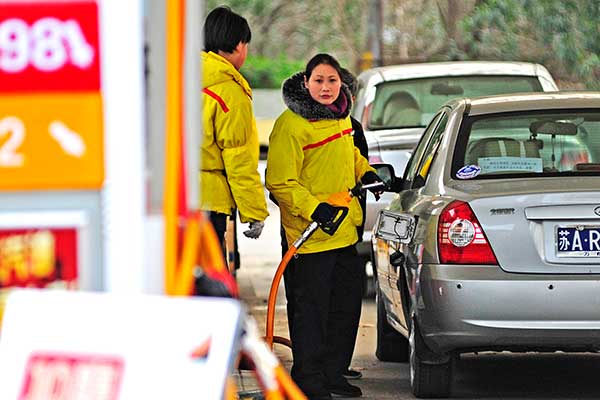
A worker helps refuel a car at a gas station in Nanjing, Jiangsu province, on Dec 14, 2016.[Photo by Qu Xing/China Daily]
China saw its biggest gasoline and diesel price increase in the past four years late last night, driven up by the output cut by OPEC and other producers.
Gasoline and diesel prices were hiked by 435 yuan ($63) and 420 yuan per metric ton, respectively, according to an announcement by the National Development and Reform Commission on Dec 14. It was the 24th price adjustment for this year.
The national average retail prices rose by 0.32 yuan (for 90-octane gasoline) and 0.36 yuan (for diesel) per liter. The prices have been fluctuating around 5 yuan per liter since the beginning of this year. For a car with a 50-liter fuel tank, it will cost another 16-20 yuan to get a full tank.
This is the ninth fuel price hike in China so far this year.
Last week, OPEC and 11 non-OPEC countries, including Russia, agreed to cut 1.8 million barrels of crude oil output per day within six months, starting from January next year.
The output curb has pushed up international oil prices. As of Dec 13, the WTI crude price increased by $1.33 per barrel to $52.83 per barrel, compared with Nov 30 when OPEC announced the output cut. The price of Brent crude increased by $1.36 per barrel to $55.69 per barrel. Both have reached the highest level so far this year.
Li Li, an analyst with ICIS China, said that global oil prices are unlikely to surpass $60 per barrel in the short run.
“International oil prices are expected to fluctuate between $55 and $60 per barrel. Output in China is not expected to increase much because the capacity that has been shut down is mostly outdated and of small facilities. The general expectation is that oil prices are not going to surge. The effect on the consumer price index is also limited,” said Li.
The last major price hike was in October, with an increase of 340 yuan and 355 yuan per ton for gasoline and diesel, also driven by the output limitation announced by OPEC at the end of September.
“OPEC has achieved its goal of an oil price hike by shedding some market share. This has also created good opportunities for the US oil industry to recover. Moreover, Rex Tillerson, the chief executive officer of ExxonMobil Corp, has just been appointed as the next US secretary of state, which will inject more impetus for the country’s oil industry,” said Li.
Zou Yanan, an analyst with SCI International, said that retailers in central, southwestern and northwestern parts of China have been limiting sales due to tight supply of gasoline and diesel.
